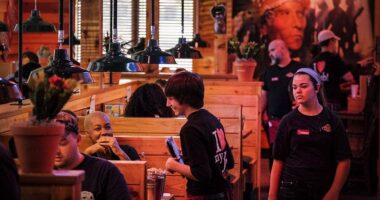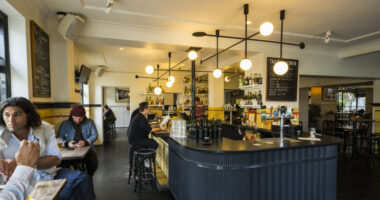On Sunday, in an exclusive extract of her new book ‘Ask Not: The Kennedys and the Women They Destroyed’, Maureen Callahan unearthed shocking claims about how Marilyn Monroe died. Now, in this final explosive extract, a stunning new theory on the 1999 crash that killed JFK Jr. and his wife Carolyn Bessette… The minute she said yes, Carolyn Bessette-Kennedy regretted it. ‘I don’t trust him,’ she’d say to family members, friends — even to a waitress at her favorite restaurant. She had finally agreed to fly with her husband, the gorgeous and adored John F. Kennedy Jr., in the small plane he was still learning to pilot, to a family wedding on Cape Cod in July 1999. Her presence was a gift, helping him to keep up appearances while their marriage was at its most tenuous. But it went against her gut instinct. She didn’t think JFK Jr., the only son of the late president, had the patience, diligence or attention span to be a good pilot. He wasn’t taking his training seriously. He hadn’t banked nearly enough hours in the air to fly alone, yet he regularly broke the rules, sneaking in solo flights when he was supposed to have an instructor with him. Not one person admonished him or threatened to take away his training certificate. No, it was just John being a Kennedy, a rogue like his much-adored father. Six weeks before, he’d needed surgery after crash-landing a contraption called ‘the flying lawnmower’, breaking his ankle. His cast had come off just the day before he planned to take to the air with Carolyn and her sister Lauren. He needed a cane and faced months of physiotherapy, but John swore his doctor had cleared him to fly. Not likely. But John was so confident. Overconfident, as usual. Carolyn would confess, in her more vulnerable moments, to feeling jolie-laide — ugly-pretty. Her eyes, more aquamarine than true-blue, were beautiful, she knew, but her nose was too long and pointy, her smile too gummy. But Carolyn had something very few women her age had: self-possession. That quality had secured her a top job in New York City with the legendary American designer Calvin Klein, despite having zero experience in fashion. She proved so good at reading people, the mercurial Calvin especially, that soon she was styling his big clients: models, movie stars, socialites, news anchors. After each wealthy female client left, her diffident mask would drop. She would turn and grill every colleague in the room: Where do you think that woman gets all her money? How did she land that guy? Where do you go to meet rich men? Famous men? Carolyn also studied Calvin’s models like Talmudic texts. How did they stay so thin? What did they do to their hair? Who did their waxing, plucking, dyeing, manicures? She copied the way they’d match a simple white T-shirt with Prada, or Converse sneakers with a floor-sweeping silk skirt. The trick was to look as if you threw it all together without thinking, when really you spent hours trying. All that effort had to look effortless. When it came to men, Carolyn tended to date only those who’d achieved a measure of fame. And, really, there was no one more famous — more desired — than John F. Kennedy Jr. So when John walked into the Calvin Klein showroom for the first time, Carolyn knew exactly what to do: Ignore him. That was the key to hooking him. She knew it instinctively. Carolyn, this nobody girl from Connecticut, could be standing in a room full of supermodels, but she was going to make John want her. When he started asking her out, Carolyn would demur and say she had other plans. Really, she’d just be holed up alone in her tiny studio apartment all weekend, hoping John would assume she was off having a fabulous time with wealthy suitors. As they grew closer, there were times she’d insult John and often tell him ‘no’, just to keep him off-kilter. But privately, more than anything, she longed to be Mrs. John F. Kennedy Jr. Keeping boyfriends on their toes was nothing new to Carolyn. ‘Date them, train them, dump them’ was her mantra. Among her boyfriends was the actor who was totally in love with her, who would sit right next to her, humiliated, while she talked to friends about how pathetic he was. Then there was the underwear model, the new face of Calvin Klein with his own billboard in Times Square. He was head-over-heels for Carolyn, but she ground him down till he felt like nothing. Once, after seeing him light another woman’s cigarette at a party, she tore up his apartment and attacked him in the street. She tried to keep that side of herself hidden from John. And when they finally became exclusive, in 1994, she turned toward her physical reinvention, one befitting a future First Lady. She was only 28 years old but took to erasing her small facial lines with Botox. She plucked her lush, thick eyebrows into wisps, bleached and ironed her hair, and dropped 15 pounds with the help of cigarettes and cocaine. The vibrant hipster with dirty-blonde hair was no more. In her place emerged a sleek, white-blonde ice queen. John’s image had long been that of an athletic, down-to-earth guy. But by the time he proposed, two years after they started dating, Carolyn had come to know the real John: moody and entitled, complicated and submissive. The latter was likely Jackie Kennedy’s doing; she had been a strict, sometimes overbearing mother. After her sudden death from cancer in 1994, John had been unmoored. That’s when he really latched on to Carolyn, who took on that role: She bossed John around now, and he liked it. She got a thrill from denigrating him in public, calling him homophobic names in front of her fashion friends, taunting him with that male model she always kept on the backburner. But one of their friends said: The only person who thought Carolyn would leave JFK Jr. for a model was JFK Jr. When John finally proposed in 1995, Carolyn waited three weeks before saying yes. Part of it was manipulation — torturing the man who had everything — but part of it was self-preservation. Her future as Mrs JFK Jr., she knew, would involve endless public scrutiny, instant global fame, and quite possibly the White House. Could she handle the attention? Her own mother had warned her against John, who had played fast and loose with Carolyn’s heart over the years. It’s not worth it, she told her daughter. But Carolyn really loved him. After their engagement, Carolyn quit her job and threw herself into training as a Kennedy wife. Almost immediately, there were problems. John expected her to cook, clean and throw dinner parties at their Tribeca loft — none of which interested her. Whenever he’d criticize Carolyn for not meeting ‘Kennedy expectations’, she’d seethe: ‘I didn’t get the f***ing employee handbook.’ The miscarriage she’d suffered shortly before she and John were engaged was another concern. As was their huge fight in New York’s Washington Square Park, the two of them caught on video pushing and hitting each other as she confronted him about the famous women he was rumored to be seeing on the side. John shoved Carolyn, then tried to yank off her engagement ring with such force that the stone broke. When Carolyn’s friends saw photos of that fight in the papers, they almost felt sorry for John. ‘That’s the real Carolyn,’ they’d say. She was now taking anti-depressants on top of the cocaine. She confessed to her mother that she still thought about her ex-boyfriend, the underwear model, who’d understood her better than anyone else. When they finally wed in a small, private ceremony in 1996, none of Carolyn’s family or friends were in her wedding party, or his — it was all Kennedys. ‘Anybody from her past, he wanted gone,’ a friend of Carolyn’s said. ‘They were grooming [her] to be John Kennedy’s wife, and John Kennedy was being groomed to go into politics. ‘I think the problem is that Carolyn created this Stepford political wife to please John. That’s when she started to die.’ Her depression intensified. Everyone thought she’d won a great prize by marrying John, but in truth, she hadn’t. He wasn’t bright or even that interesting, she realized – just a man who’d been over-indulged all his life. Responsibilities were for other people, not John Kennedy. He rode around the city on his bicycle and never locked it up. He spent thousands of dollars replacing bike after bike. When it came to his public image, however, he was nowhere near as thoughtless. He was always in the tabloids with his shirt off, running out of the surf or playing touch football in Central Park, displaying his perfectly sculpted body. The truth was that John was a terrible athlete, totally uncoordinated. But he looked the part. John lived on Planet Kennedy, where he was the undisputed king. And as he grew up, he took for granted the never-ending awe at his good looks and his lineage as American royalty. Whatever he wanted to do, he was confident others would take care of the details. His latest brainstorm, a magazine combining politics and pop culture called George, was only ever doomed to fail, but John didn’t listen. Nor did he think anyone else should be editor-in-chief — despite John having no experience in journalism or ever managing employees or running a company. George was bound to be a hit because of who he was, he calculated, and it would give him the gravitas for a run at becoming a US senator or the governor of New York. With his friend and business partner Matt Berman, he enrolled in a two-day course called ‘How to Start Your Own Magazine’, then started pitching George around town. One executive couldn’t believe John’s gall in asking for a $20 million investment without being able to answer basic questions, such as: Who was the magazine’s audience? What was the voice? Who would John hire to write? What stories would the magazine break? Another executive was brutal in his post-pitch assessment. ‘I’m JFK, so there you go,’ the publisher recalled. He deemed it ‘the worst presentation I had ever seen in my life.’ But Carolyn — Carolyn knew her stuff. She was a real asset to George in the beginning, bringing her exacting eye to covers, models and layouts. She courted advertisers with John and was a hit with Donatella Versace and Giorgio Armani. For once, people were paying less attention to John than they did to his wife, the cool and charming Carolyn, who had worked in media herself and was so much smarter than her husband. But in 1997, two years after hitting the newsstands, George went from being one of the most successful launches in magazine history to a spectacular failure, teetering on the brink of insolvency. Worse, no one read it. John, as editor-in-chief and face of the magazine, was now openly derided as dumb – a label that had plagued him since he’d failed his law exams twice in his twenties. So what did he do when George was at its most vulnerable, with its publisher getting ready to pull the plug? He simply took off on three weeks’ holiday. John’s carelessness was rivalled only by his recklessness. He had a death wish — not only for himself, but the women in his life. He had more near-misses in his teens and twenties than the public knew. Speeding, swimming too far out into the ocean, driving recklessly onto pavements or while high on pot, skiing in white-out conditions, acting like an expert in all sports when he was really just an amateur — there was little John wouldn’t dare, and he bullied almost everyone in his life to be as wild as he was. He’d nearly killed his first serious girlfriend, Christina, more than once. In 1986, he’d taken her kayaking in the open sea off Jamaica, without life jackets or the spray skirts that would keep water out, completely inexperienced in negotiating the open sea. ‘Nothing to be afraid of,’ he told Christina. They found themselves helpless, strong currents pushing them towards a giant boulder. Had they hit it, they would have died – but, at the very last second, a rogue wave lifted them to safety. Crash-landing on a remote beach, John went into a trance. ‘Don’t tell Mummy’, he said. ‘Don’t tell Mummy’. The weird thing was the look in his eyes, Christina later wrote. It was almost as if he was turned on. Dying, getting that close to it, seemed a high for him. When she refused to get back in the kayak, a group of fishermen offered to take them to the mainland the following morning. No, John insisted. They would kayak back that night. So off they went, but the swells were much bigger this time and suddenly they were 15ft underwater. This is it, Christina thought: we’re going to die. Somehow, miraculously, the kayak spun and broke the surface, only to be pushed underwater by another sudden wave, then back up again. John was screaming at Christina to bail water – but he hadn’t packed a bailer. Years later, Christina was still unable to remember how they’d survived. ‘We could have died,’ she told him when they reached land. ‘Yeah,’ he said. ‘But what a way to go.’ Even though John had moved out of their marital flat by the summer of 1999, he was determined that Carolyn should accompany him to his cousin’s wedding. This, even as reports were emerging that his ex-girlfriend – the actress Daryl Hannah – back in the picture. Even as John’s colleagues at George over-heard him yelling at Carolyn down the phone to ‘get the f*** out of my life!’ He was telling friends that Carolyn was crazy, that she had five times-a-week therapy sessions and a nasty drug habit and refused to have sex with him. On a recent commercial flight, loud enough for fellow passengers to hear, John had told his wife: ‘Maybe we should get divorced. We f***ing talk about it enough.’ So why on earth, then, did he want Carolyn to fly with him? The truth was that he needed her. His magazine was collapsing. His cousin Anthony, truly more like a brother, was dying of cancer. The last thing he wanted was the press speculating about his marriage. John F. Kennedy Jr., an utter failure. It was unthinkable. John’s own assistant – who had become close to Carolyn – strongly advised her to get on the flight. Otherwise, she said, the media would report they were getting divorced. That was uncomfortably close to the truth. And Carolyn knew that if her marriage failed, she’d inevitably be blamed. She wanted out, but also felt trapped. ‘I can’t get a divorce,’ she’d say. ‘I’ll wind up living in a trailer park, out of my mind, going: ‘I used to be married to JFK Jr’.’ July 16, 1999. Carolyn finally agreed to get on that plane. Unlike just two weeks prior – when she had demanded John fly with a flight instructor on board – this time, John insisted on flying without one. At 8.10 pm, John had turned up on crutches, along with Carolyn’s sister Lauren, at Essex County airport in New Jersey, far later than planned, carrying an open bottle of wine. Lauren had offered to fly with them, to broker a kind of peace. Carolyn, in a black sleeveless top and cigarette pants, arrived ten minutes afterwards. Another small-plane pilot told John he was alarmed by the worsening visibility, and that he might want to wait. ‘No chance,’ John said. A flight instructor offered to go up with him, but John refused. ‘I want to do it alone’, he said. Before his scheduled take-off, four other pilots had to use their instruments to land in the worsening haze. Other, far more experienced pilots took one look at the sky that night and said: No way. Not John. At 8.38 pm, he was given clearance to take off in his Piper Saratoga, despite defying one of aviation’s most basic rules: he hadn’t filed a flight plan. Once aloft, he defied another and cut off all communication with air traffic control. Less than 20 minutes later, Carolyn and Lauren strapped into their back seats, John was on a collision course with a commercial airliner. The pilots of American Airlines flight 1484, with 128 passengers and six crew members aboard, tried to reach John but got radio silence. They sent an emergency message to ground control, who couldn’t make contact with him either. Without knowing which way the clueless pilot of this small prop plane was going, the American Airlines pilots had to divert from their flight path to avoid a fatal mid-air collision. John kept on climbing. At 5,500 feet, despite the fog and worsening visibility, he didn’t turn on his autopilot. Nor did he hug the lit-up coastline. Instead, he turned right and went out over the Atlantic, and before he knew it the sea and sky had turned into one seamless black mass and he couldn’t tell up from down. Now would have been the time to start using his instruments, but he couldn’t. Now would have been the time to radio ground control, but he did not. The question is unavoidable: Was JFK Jr. flirting with murder-suicide that night? His marriage was in tatters, as was his magazine. His sister Caroline, upset that John was trying to stop her from auctioning off their mother’s possessions — Jackie’s deathbed suggestion — was barely speaking to him. The plane went into a graveyard spiral, falling 900 feet per minute, 200 miles per hour, nose first into the ocean. Carolyn and Lauren would have known they were going to die. Carolyn Bessette-Kennedy was only 33. Her sister Lauren Bessette, a rising star at Morgan Stanley, was 34. In the aftermath of this latest ‘Kennedy tragedy’, it was Carolyn’s vanity, her superficiality, her drug use, her all-around ‘shrewish’ behavior that was blamed for leading an inexperienced pilot — a man who broke just about every rule of flying — to crash his plane into the ocean. Years later, one author made the specious claim that Carolyn caused the accident because, on the afternoon of the flight, she’d made a pedicurist redo her toenails three times, thus delaying take-off. Another blame-shifting version, which only would have come from Camp Kennedy, had Carolyn waiting for her tardy drug dealer. In the 25 years since the crash, Carolyn has only ever been depicted — in countless articles, biographies, memoirs, documentaries, and TV specials — as the drug-addled harridan who made the last days of America’s prince so miserable. And, so goes the implication: if John Jr. hadn’t been so miserable he wouldn’t have been so distracted; and if he hadn’t been so distracted, he wouldn’t have crashed the plane. Yet the resulting investigation by the National Transportation Safety Board found John alone responsible for this entirely avoidable tragedy. In 2001, Carolyn and Lauren’s mother, Ann Freeman, reportedly received millions in a wrongful-death settlement against his estate. Even today, John is still lionized, while his wife is blamed for the shocking death of a potential political giant — her sister Lauren a mere footnote. Lisa Bessette, Lauren’s twin sister and Ann’s only surviving child, lives quietly in the American Midwest. Every July, she reportedly leaves the United States to escape anniversary coverage of the crash. UK READERS: Adapted from ‘Ask Not’ by Maureen Callahan, to be published by Harper Collins on July 4 at £25. © Maureen Callahan 2024. To order a copy for £22.50 (offer valid to 30/06/24; UK P&P free on orders over £25) go to mailshop.co.uk/books or call 02031762937. US READERS: Adapted from ‘Ask Not’ by Maureen Callahan. Copyright © 2024 by Maureen Callahan. Used with permission of Little, Brown and Company. New York, NY. All rights reserved. Order a copy here.
Subscribe
Login
0 Comments





